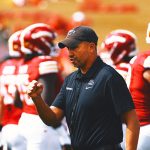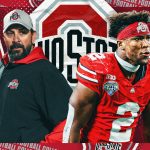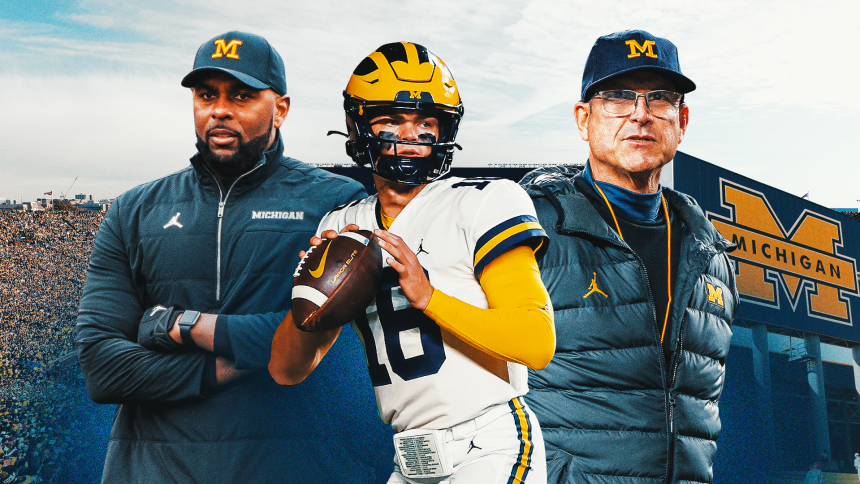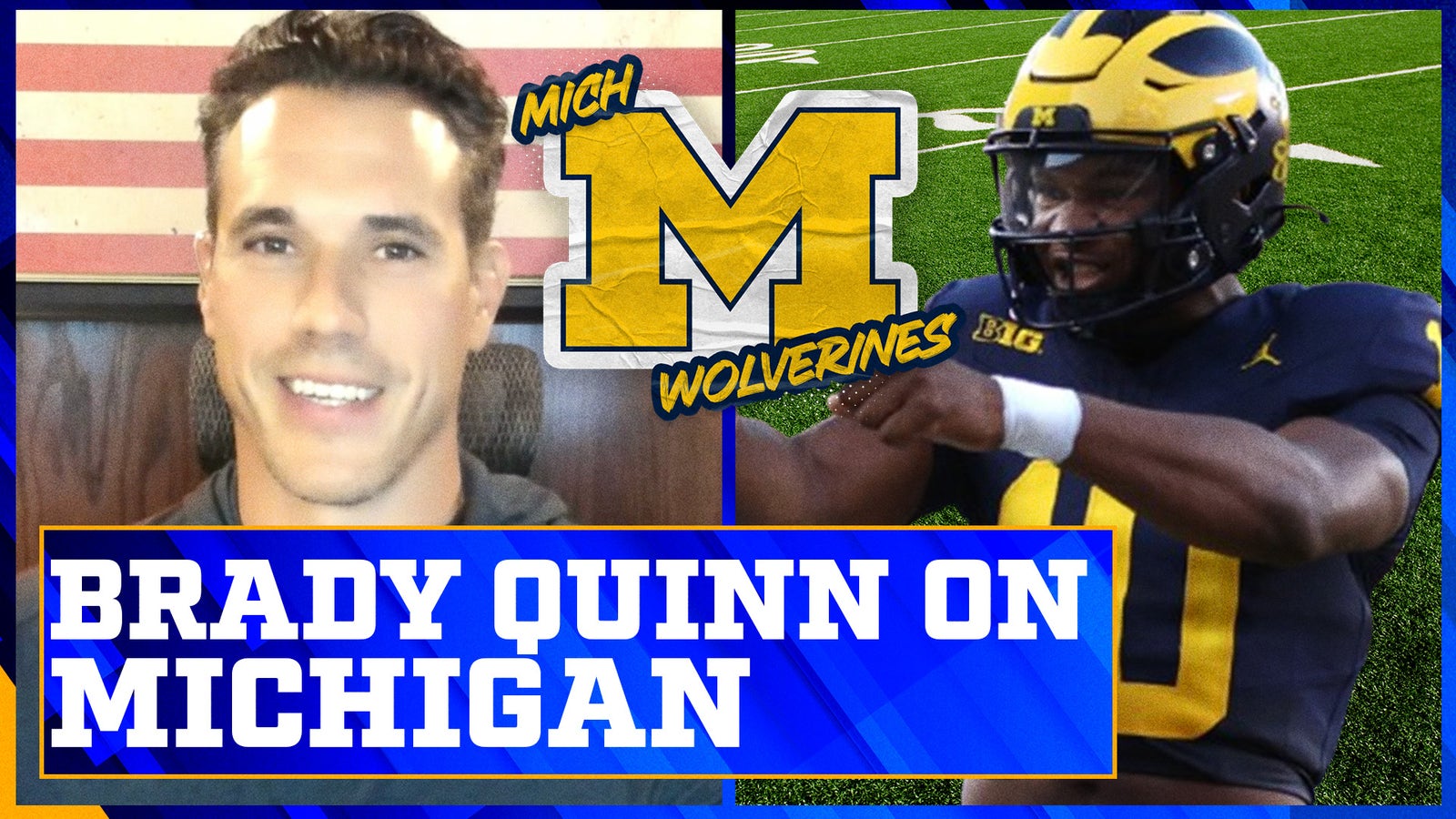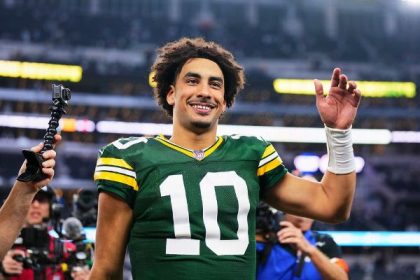A few years into Jim Harbaugh’s tenure at Michigan, a handful of coaches and members of the recruiting department gathered in a room to study film of high school quarterbacks. The group included Harbaugh, assistant head coach and passing game coordinator Pep Hamilton, director of player personnel Sean Magee and player personnel analyst Connor Anderson, among others. They watched cutups of 10 or 15 quarterbacks before Harbaugh asked for the tape to be turned off and each person to find their own corner of the room. From there, Harbaugh instructed everyone to rank their top three or four quarterbacks on individual white boards.
“And everybody kinda went around the room and talked about who they liked the most and why they liked them,” Anderson told FOX Sports. “And [Harbaugh] was always open to hear from different people. If you saw it a different way than he did, he was respectful of it. He wasn’t demeaning in any way. He wasn’t like, ‘Man, that’s the dumbest thing I’ve ever heard.’ He was open. And obviously, at the end of the day, we were going to do what he wanted to do, but that didn’t keep him from asking people’s opinions at all. He was awesome to work with.”
The story offers a window into Harbaugh’s process for recruiting quarterbacks, a methodology described by ex-Michigan assistants and recruiting staffers as both collaborative and incredibly broad in scope. Harbaugh and Hamilton, who worked together in Ann Arbor from 2017-18, a stretch of roster building that helped lay the foundation for the program’s post-pandemic surge to the College Football Playoff, were said to be exhaustive in their research of underclassmen high school quarterbacks. The former became enamored with a youthful dual-threat prospect from California named Jayden Daniels long before that player cracked the top 200 in the national recruiting rankings or developed into a Heisman Trophy winner at LSU. The latter believed the Wolverines had a legitimate chance at landing Caleb Williams, another future Heisman Trophy winner for USC, after Hamilton offered him a scholarship in ninth grade.
“We recruited [almost] all of the [first-round] quarterbacks in this most recent draft,” Hamilton told FOX Sports, a list that included Williams (No. 1 overall), Daniels (No. 2 overall), Drake Maye (No. 3 overall), J.J. McCarthy (No. 10 overall) and Bo Nix (No. 12 overall). Former Washington quarterback Michael Penix Jr., who went eighth overall, was the only first rounder that Hamilton said the Wolverines never pursued.
ADVERTISEMENT
All of which begs the question of how Michigan, the defending national champion and winner of the last three Big Ten titles, could arrive at its 2024 campaign with a collection of quarterbacks that — at least on paper — is seemingly bereft of high-level, game-changing talent. How could a program that just enjoyed its most successful three-year stretch in history wind up beholden to a competition between a seventh-year journeyman in Jack Tuttle, a former walk-on in Davis Warren and two former three-star prospects in Alex Orji and Jayden Denegal? How did the Wolverines get here ahead of Saturday’s showdown with No. 3 Texas (12 p.m. ET on FOX and the FOX Sports App), a team whose starting quarterback, Quinn Ewers, and whose backup, Arch Manning, were both the top overall recruits in the country for their respective classes?
The answers to those queries lie amid a complex web of factors that range from prospect misidentification to meteorological and schematic challenges, from persistent staff turnover at offensive coordinator and quarterbacks coach to deficiencies in NIL resources and an apparent shift in transfer portal ideology. Together, those challenges have left first-year head coach Sherrone Moore and first-year offensive coordinator Kirk Campbell choosing between Warren, who joined the program as a zero-star recruit, and Orji, the one-time Virginia Tech commit who began his high school career at wide receiver. Warren started the opener and completed 15 of 25 passes for 118 yards, one touchdown, one interception and a passer rating of 68.4 in an unconvincing win over Fresno State. But defeating Texas is an entirely different challenge.
“If you were to say that Michigan is capable of recruiting a J.J. McCarthy (five-star prospect) every cycle or every other cycle, I would say absolutely they are,” said Cooper Petagna, a former recruiting coordinator under Harbaugh and now a national recruiting analyst for 247Sports, during an interview with FOX Sports. “And that should be the standard that they have at that place. And I’m not saying that it isn’t, but I do think it’s interesting [what has transpired].”
Despite the dedication and thoroughness that colleagues said Harbaugh showed when recruiting quarterbacks, the final acts of landing and developing elite high school signal-callers proved difficult for him across nine years in Ann Arbor. The first two quarterbacks Harbaugh signed as part of his initial recruiting class in 2015 — four-star prospects Zach Gentry (No. 176 overall, No. 8 pro-style QB) from New Mexico and Alex Malzone (No. 288 overall, No. 12 pro-style QB) from nearby Bloomfield Hills, Michigan — never attempted a pass for the Wolverines. Gentry wound up converting to tight end and developed into a fifth-round pick by the Pittsburgh Steelers in 2019, while Malzone later transferred to Miami (Ohio) after three seasons at Michigan.
Malzone’s departure set in motion the pattern of high school quarterbacks signed by Harbaugh completing their collegiate careers somewhere else, a trend that is far from unique to Michigan but worth noting nonetheless. Malzone, Brandon Peters (Illinois), Dylan McCaffrey (Northern Colorado), Joe Milton III (Tennessee) and Cade McNamara (Iowa) were all blue-chip prospects who chose to leave Ann Arbor. Three-star quarterback Dan Villari (Syracuse) also departed, though he later changed positions and became a tight end. In total, six of the first seven quarterbacks signed by Harbaugh from 2015-19 ended up transferring, with McNamara and Milton the only players among them to throw for more than 600 yards in a Michigan uniform.
“When I first got to Michigan, I couldn’t believe how cutthroat the quarterback room was,” one former assistant coach told FOX Sports. He added: “Whatever was going on with the whole situation with [the competition between] Joe Milton and Cade and everybody else who had been there before, it was just cutthroat. They were against each other, you know?”
The period of division in Michigan’s quarterback room coincided with a chunk of Harbaugh’s tenure in which there was significant turnover at both offensive coordinator and quarterbacks coach. Harbaugh’s initial offensive coordinator, Tim Drevno, who had been with him during previous stops at San Diego, Stanford and with the San Francisco 49ers, resigned after the Wolverines ranked 105th in total offense during the 2017 season. What followed was a five-year stretch in which Michigan had four different coaches serving as coordinator, co-coordinator or defacto coordinator without the title amid wide-ranging schematic changes. Hamilton’s pro-style offense gave way to Josh Gattis’ brief “speed in space” experiment before Moore was promoted to co-coordinator in 2021 and Matt Weiss was hired from the Baltimore Ravens to retool the rushing attack, which quickly became the team’s — and Harbaugh’s — preferred offensive identity.
The Wolverines also churned through five quarterback coaches in eight years with Jedd Fisch (2016), Hamilton (2017-18), Ben McDaniels (2019-20), Weiss (2021-22) and Campbell (2023-present), some of whom brought far more charisma and aggressiveness to the recruiting trail than others. Hamilton succeeded in signing Milton and earning a verbal commitment from McNamara during his two-year run. McDaniels and Gattis were the leading figures when McCarthy became the only five-star quarterback to commit during Harbaugh’s tenure. Weiss, meanwhile, was frequently maligned by fans and recruiting writers alike when the Wolverines missed on highly touted in-state prospects Dante Moore (No. 5 overall, No. 3 QB in 2023) and CJ Carr (No. 68 overall, No. 6 QB in 2024), whose grandfather, Lloyd Carr, was the head coach at Michigan from 1995-2007. Moore and Carr committed to UCLA and Notre Dame, respectively, though the former has since transferred to Oregon.
Another blue-chip signal caller from Michigan, five-star prospect Bryce Underwood, who is the No. 1 overall player in the country for 2025, committed to LSU over the Wolverines and dozens of other suitors earlier this year. But Campbell, who doubles as the Wolverines’ offensive coordinator, had already endeared himself to fans by salvaging the recruitment of four-star prospect Jadyn Davis (No. 112 overall, No. 9 QB in 2023) shortly after being named quarterbacks coach the year prior and later securing verbal pledges from four-star quarterbacks Carter Smith (No. 159 overall, No. 13 QB in 2025) and Brady Hart (No. 93 overall, No. 7 QB in 2026) in the next two cycles.
“I think it’s a program coming off a national championship,” Petagna told FOX Sports. “And even if they weren’t, they’ve got the recruiting chops and the right pitch, not only between what they do from a player development standpoint, but from an academic standpoint and having the world’s greatest alumni network. There is a lot to sell there. There shouldn’t be any door that isn’t open for them.”
The veracity of that statement varies depending on who’s being asked. For all the positives Moore and Campbell can share with prospective quarterbacks in the coming years — from academics and facilities to the archetype of McCarthy and a slew of NFL Draft picks — the Wolverines are never one of the programs mentioned at the forefront of player compensation through collectives and NIL, though Harbaugh always praised the importance of revenue sharing with athletes. To some extent, Michigan’s inability or unwillingness to pay top dollar for quarterbacks in the transfer portal places limitations on how Moore can shape his roster at the sport’s most important position.
It was around the time when the NCAA introduced the transfer portal, on Oct. 15, 2018, that Harbaugh’s approach to pursuing quarterbacks appeared to shift. During his first few years, Harbaugh added several transfer signal-callers who were capable of, and expected to, contend for the starting job immediately upon arrival: Jake Rudock from Iowa, John O’Korn from Houston and Shea Patterson from Ole Miss. But when Michigan broke through and reached three consecutive College Football Playoffs, once with McNamara and twice with McCarthy, the prototype had largely changed. By then, Harbaugh’s pursuit of transfer quarterbacks was geared more toward experienced backups whose veteran leadership was equally valuable on or off the field: Alan Bowman from Texas Tech and Tuttle from Indiana and Utah.
Some of that is a product of Michigan’s well-documented struggles with accepting undergraduate credits from transfers, a roadblock that one former coach said often precludes them from pursuing rising sophomores, juniors and seniors in the portal. Instead, the Wolverines’ forays into the portal during Harbaugh’s ascension to the national championship leaned heavily on graduate transfers — the type of players whose admissions in Ann Arbor were akin to the blank slates of incoming freshmen. And even though some of the more hotly pursued quarterbacks in this year’s portal cycle were graduate students, namely Kansas State transfer Will Howard (Ohio State) and Oklahoma transfer Dillon Gabriel (Oregon), the Michigan offensive brain trust of Moore and Campbell elected to stand firm with the players already on the roster, repeatedly batting away the notion of adding a transfer once McCarthy declared for the NFL Draft.
“That is not part of our thought process right now,” Campbell said in April after the team’s spring game. “Roster evaluation is always part of the process, but right now, that’s not something we’re looking at.”
Other former coaches and recruiting staffers cited additional challenges when it comes to landing high-level quarterbacks at Michigan, some of which were — and still are — self-inflicted. The run-heavy nature of Harbaugh’s offense meant that even McCarthy, arguably the most talented quarterback to ever play for the Wolverines, threw the ball far less often than the contemporaries he was drafted alongside earlier this year. McCarthy ranked 53rd nationally in passing attempts last season with 332, while the quintet of Penix, Nix, Maye and Williams combined to average 459.5 passes. Warren’s total of 25 attempts in the Week 1 win over Fresno State was tied for 75th nationally and tied for 11th in the Big Ten as part of a system that is virtually the same as what Michigan ran last year. Those numbers could dip even further once summer turns to fall and fall transitions to winter ahead of the College Football Playoff, with weather in the Midwest always favoring smash-mouth football.
It meant that coaches like Hamilton and Harbaugh were left to cite things like their NFL experience and penchant for developing prospects rather than enticing them with the potential of setting school records or finishing a season in New York City as a Heisman Trophy finalist. And that’s not the kind of pitch that works on everyone.
“The quarterbacks that we were recruiting were also recruited by some of the other blue-blood programs,” Hamilton said. “So it was an ongoing process to convince them that, ‘Hey, coming to Michigan, where we’re not as pass-happy as some other programs, will still be beneficial for your career in the long run or your desires to play in the NFL.'”
As this year’s quarterback competition between Tuttle, Warren and Orji has shown, that can be far from an easy task.
Michael Cohen covers college football and basketball for FOX Sports with an emphasis on the Big Ten. Follow him at @Michael_Cohen13.
[Want great stories delivered right to your inbox? Create or log in to your FOX Sports account, follow leagues, teams and players to receive a personalized newsletter daily.]
recommended

Get more from College Football Follow your favorites to get information about games, news and more

